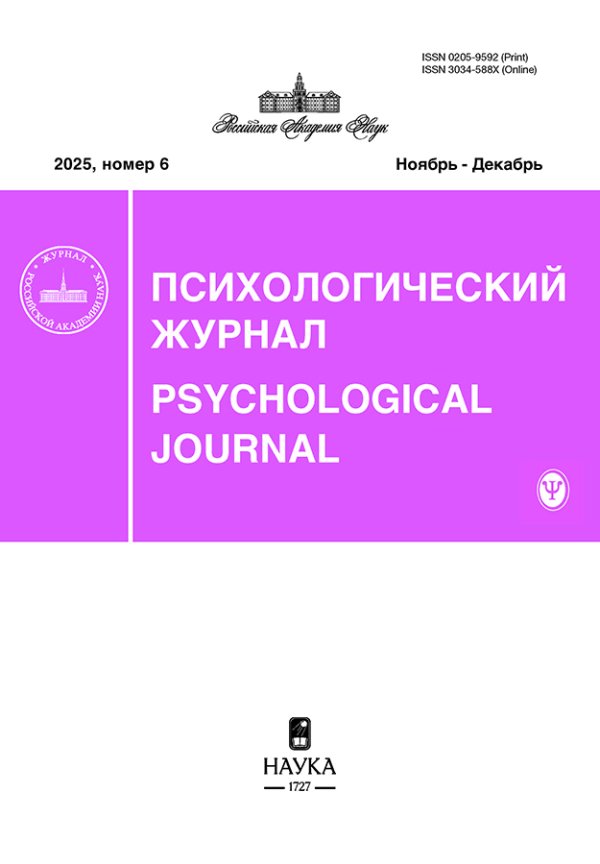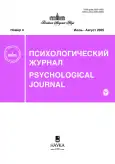Prediction and determination of forgiveness in situations of inter- and intra-ethnic interaction
- Authors: Khotinets V.Y.1, Sudnishchikova A.V.1,2, Kozhevnikova O.V.1
-
Affiliations:
- Udmurt State University
- Glazov State Engineering and Pedagogical University named after V.G. Korolenko
- Issue: Vol 46, No 4 (2025)
- Pages: 70-84
- Section: Cross-cultural psychology
- URL: https://bakhtiniada.ru/0205-9592/article/view/309371
- DOI: https://doi.org/10.31857/S0205959225040073
- ID: 309371
Cite item
Abstract
The problem of turning to the moral basis of a person’s socio-cultural experience, traditional humanistic values in relations with the modern multicultural world is posed. Theoretical models of prediction and determination of forgiveness (readiness to forgive, lack of rumination) in the interethnic and intra-ethnic interaction of individuals with different ethno-linguistic status have been constructed. Respondents: N = 249, citizens of the Russian Federation (105 – Slavic group, 71 – Finno-Ugric group), citizens of Uzbekistan, Kazakhstan, Turkmenistan (73 – Turkic group). The results were processed using the Kraskel–Wallis H-test, the Mann–Whitney U-test, multiple regression analysis, and structural equation modeling. Regression equations have been built to predict forgiveness with the identification of complexes of predictors and determinants in a situation of interethnic and intra-ethnic interaction. The maximum effects of personal and communicative-behavioral determinants of forgiveness and readiness to forgive in the interaction with “insiders” and “outsiders” have been established cultural and environmental (cultural values of equality and social justice) predictors of the readiness of forgiveness of “others”, socio-demographic (ethno-linguistic status) predictors of the readiness to forgive of “insiders” have been identified. Along with the correlation of “outsiders” with a positive ethnic identity, there is a correlation between the readiness to forgive and ethnic indifference in the interaction with the dominant ethnic group. The results of the study are of practical importance in predicting interethnic relations at the regional (national-territorial formations of the Russian Federation) and international (friendly states of Central Asia) levels.
About the authors
V. Yu. Khotinets
Udmurt State University
Author for correspondence.
Email: khotinets@mail.ru
426034, Izhevsk, Universitetskaya St., 1, Russia.
A. V. Sudnishchikova
Udmurt State University; Glazov State Engineering and Pedagogical University named after V.G. Korolenko
Email: sudnishikova.alena@ya.ru
426034, Izhevsk, Universitetskaya St., 1, Russia.; 427621, Glazov, Pervomaiskaya St., 25, Russia.
O. V. Kozhevnikova
Udmurt State University
Email: mail-to@oksana-kozhevnikova.ru
426034, Izhevsk, Universitetskaya St., 1, Russia.
References
- Altuhova L.V. Sklonnost’ k refleksii kak faktor, opredelyayushchij perezhivanie viny i proshcheniya. Evrazijskij nauchnyj zhurnal. 2017. № 1. P. 81–82. (In Russian)
- Bol’shunova N.Ya., Ustinova O.A. Psihologicheskie i sociokul’turnye smysly proshcheniya i razvitie sposobnosti k nemu. Eds.: M.I. Volovikova, A.L. Zhuravlev, A.V. Yurevich. Duhovno-nravstvennye problemy sovremennoj lichnosti. Moscow: Institut psihologii RAN, 2018. P. 204–225. (In Russian)
- Bychkova M.V. Proshchenie kak social’no-psihologi- cheskij fenomen. Vestnik Kostromskogo gosudarstvennogo universiteta. Seriya: Pedagogika. Psihologiya. Sociokinetika. 2021. V. 27. № 1. P. 32–39. (In Russian)
- Il’in E.P. Psihologiya sovesti: vina, styd, raskayanie. Saint-Petersburg: Piter, 2021. 288 p. (In Russian)
- Lebedeva N.M., Tatarko A.N. Social’no-psihologiches- kie faktory etnicheskoj tolerantnosti i strategii mezhgruppovogo vzaimodejstviya v polikul’turnyh regionah Rossii. Psikhologicheskii zhurnal. 2003. V. 24. № 5. P. 31–44. (In Russian)
- Makarenko-Kurnosova M.V. Proshchenie kak fenomen kul’tury: koncepcii i sovremennye praktiki: PhD (Philosophy) Thesis. Rostov-na-Donu, 2023. (In Russian)
- Marcinkovskaya T.D., Kiseleva E.A. Problema pozitivnoj socializacii v sovremennom mul’tikul’turnom mire. Psi- khologicheskii zhurnal. 2018. V. 39. № 3. P. 73–89. (In Russian)
- Nartova-Bochaver S.K., Adamyan A.A. Sposobnost’ proshchat’ i domashnyaya sreda kak aspekty mezhlichnostnogo vzaimodejstviya. Social’naya psihologiya i ob- shchestvo. 2020. V. 11. № 1. P. 193–210. (In Russian)
- Pibodi D., Shmelev A.G., Andreeva M.K., Gramenickij A.E. Psihosemanticheskij analiz stereotipov russkogo haraktera: krosskul’turnyj aspect. Voprosy psihologii. 1993. № 3. P. 101–109. (In Russian)
- Pochebut L.G., Beznosov D.S. Assertivnost’ i tolerantnost’ v mezhkul’turnom vzaimodejstvii. Social’naya psiholo- giya i obshchestvo. 2017. V. 8. № 3. P. 8–19. (In Russian)
- Samoregulyaciya i prognozirovanie social’nogo povedeniya lichnosti: Dispozicionnaya koncepciya. Moscow: CSPiM, 2013. 376 p. (In Russian)
- Triandis G.K. Kul’tura i social’noe povedenie. Moscow: Forum, 2007. 382 p. (In Russian)
- Hotinec V.Yu., Korobejnikova Ya.P. Psihologicheskie mekhanizmy produktivnogo koping-povedeniya v problemnyh kommunikativnyh situaciyah. Psikhologicheskii zhurnal. 2016. V. 37. № 4. P. 59–73. (In Russian)
- Hotinec V.Yu., Molchanova E.A. Oposreduyushchaya rol’ etnicheskogo obraza v mezhetnicheskih otnosheniyah. Psikhologicheskii zhurnal. 2014. V. 35. № 3. P. 40–57. (In Russian)
- Chelovek v usloviyah global’nyh riskov: social’no-psihologicheskij analiz. Eds.: T.A. Nestik, A.L. Zhuravlev. Moscow: Institut psihologii RAN, 2020. 594 p. (In Russian)
- Chukova A.S. Social’no-psihologicheskie harakteristiki proshcheniya kak fenomena mezhlichnostnogo obshcheniya: PhD (Psychology) Thesis. Saratov, 2011. (In Russian)
- Berry J.W., Poortings Y.H., Segall M.H., Dasen P.R. Cross-cultural psychology: research and applications. New York: Cambridge University Press, 2002. 646 p.
- Brinker J.K., Campisi M., Gibbs L., Izzard R. Rumination, mood and cognitive performance. Psychology. 2013. № 4. Р. 224–231.
- Cabras C., Kaleta K., Mróz J., Loi G., Sechi C. Gender and age differences in forgivingness in Italian and Polish samples. Heliyon. 2022. № 8(6). Art. e09771.
- Heszen I., Charzyńska E. Zdolność do wybaczania i jej pomiar przy pomocy polskiej adaptacji Skali Wybaczania L.L. Toussainta, D.R. Williamsa, M.A. Musicka i S.A. Everson. Przeglad Psychologiczny. 2013. № 4. Р. 423–446.
- Ghaemmaghami P., Allemand M., Martin M. Forgiveness in younger, middle-aged and older adults: Age and gender matters. Journal of Adult Development. 2011. № 18. Р. 192–203.
- Hamer K., Penczek M., Bilewicz M. “Humanum ignoscere est”. The relationship of national and supranational identifications with intergroup forgiveness. Personality and Individual Differences. 2017. № 105. P. 257–263.
- Hampton L.E., Carruth N.P., Lurquin J.H., Miyake A. Personality correlates of dispositional forgiveness: a direct comparison of interpersonal and self-forgiveness using common transgression scenarios. Frontiers in Psychology. 2023. № 14. Art. 1218663.
- Hook J.N., Worthington E.L., Utsey S.O., Davis D.E., Gartner A.L., Jennings D.J., Dueck A. Does forgiveness require interpersonal interactions? Individual differen- ces in conceptualization of forgiveness. Personality and Individual Differences. 2012. № 53. Р. 687–692.
- Koutsos P., Wertheim E.H., Kornblum J. Paths to interpersonal forgiveness: The roles of personality, disposition to forgive and contextual factors in predicting forgiveness following a specific offence. Personality and Individual Differences. 2008. № 44. Р. 337–348.
- Lawler-Row K.A., Karremans J.C., Scott C., Edlis-Matityahou M., Edwards L. Forgiveness, physiological reacti- vity and health: The role of anger. International Journal of Psychophysiology. 2008. № 68 (1). P. 51–58.
- Lichtenfeld S., Maier M.A., Buechner V.L., Fernández Capo M. The influence of decisional and emotional forgiveness on attributions. Frontiers in Psychology. 2019. № 10. Art. 1425.
- McCullough M.E., Fincham F.D., Tsang J.-A. Forgiveness, forbearance, and time: The temporal unfolding of transgression-related interpersonal motivations. Journal of Personality and Social Psychology. 2003. № 84 (3). Р. 540–557.
- Patil A., Shaikh A., Gabrekar R., Kamble S. Forgiveness and satisfaction with life in PG students of Karnatak University. Indian Journal of Positive Psychology. 2018. № 9 (1). Р. 121–125.
- Purcell N., Griffin B.J., Burkman K., Maguen S. “Opening a door to a new life”: The role of forgiveness in healing from moral injury. Frontiers in Psychiatry. 2018. № 9. Art. 498.
- Thompson L.Y., Snyder C.R., Hoffman L. et al. Dispositional forgiveness of self, others, and situations. Journal of Personality. 2005. № 73. Р. 313–359.
Supplementary files










